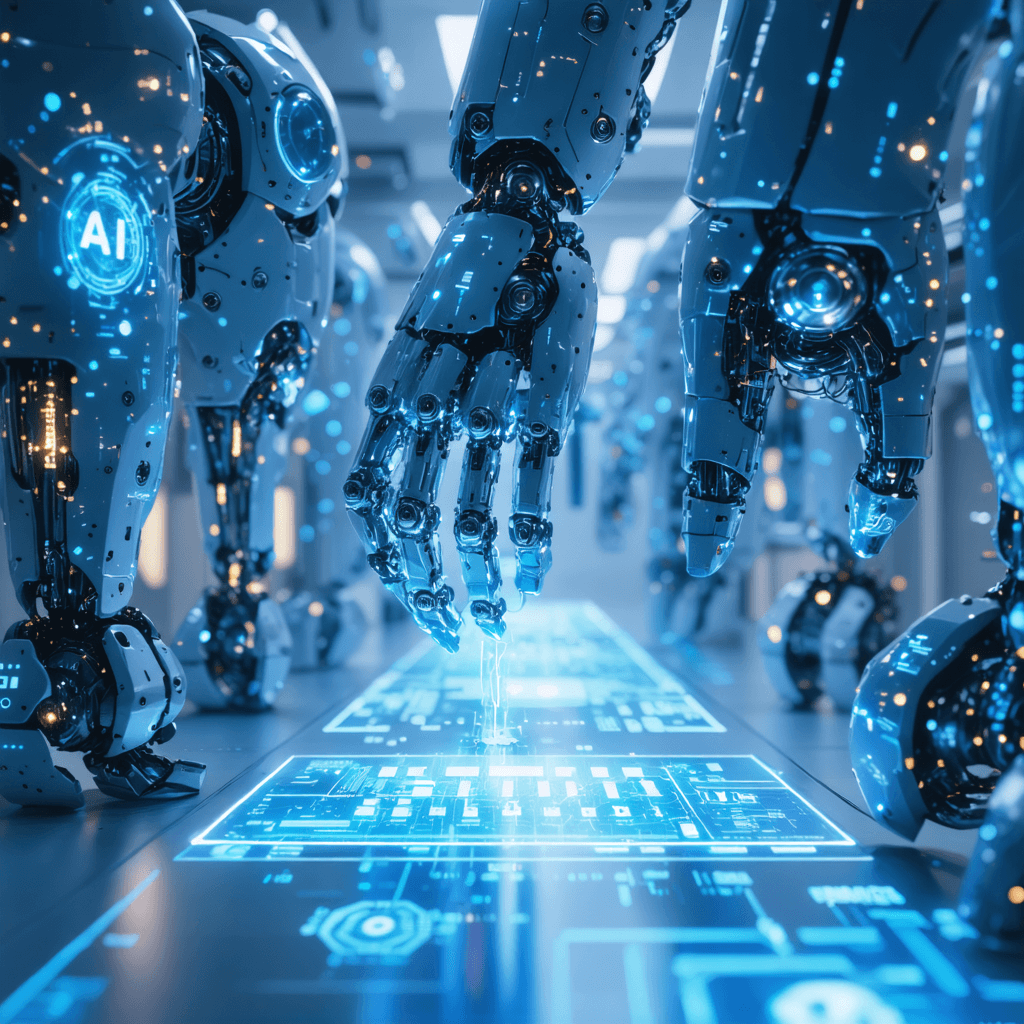AI Revolution 2025: From Smart Factories to Digital Doctors - How AI is Reshaping Our World Today
In the wake of unprecedented technological advancement, 2025 has emerged as a pivotal year in the AI revolution, fundamentally transforming industries and reshaping how we live and work. From manufacturing floors to medical consultations, artificial intelligence has become deeply woven into the fabric of our daily lives, creating a new paradigm of human-machine collaboration.
The Rise of Smart Factories
Manufacturing has undergone a remarkable metamorphosis with the widespread adoption of AI-powered smart factories. These facilities now operate with unprecedented efficiency, utilizing advanced robotics and machine learning algorithms to optimize production processes in real-time. Industry leaders report a 35% increase in productivity and a 40% reduction in operational costs since implementing AI-driven systems.
The integration of predictive maintenance systems has virtually eliminated unplanned downtime, with AI algorithms accurately forecasting equipment failures before they occur. Major manufacturers like Tesla and Siemens have reported maintenance cost reductions of up to 25% in their smart facilities during the first half of 2025.
Healthcare Revolution: Digital Doctors and AI Diagnostics
The healthcare sector has witnessed perhaps the most impactful transformation. AI-powered diagnostic tools now achieve accuracy rates exceeding 95% in detecting various conditions, from cancer to rare genetic disorders. Virtual health assistants, equipped with natural language processing capabilities, handle millions of patient inquiries daily, significantly reducing the burden on healthcare professionals.
Telemedicine platforms enhanced by AI have made healthcare more accessible than ever, with rural communities experiencing a 60% improvement in access to specialist consultations. The integration of AI in drug discovery has also accelerated the development of new treatments, with pharmaceutical companies reporting a 50% reduction in research timelines.
Financial Services: The AI Banking Evolution
The financial sector has embraced AI to enhance customer service, risk assessment, and fraud detection. AI-powered chatbots now handle over 70% of customer inquiries in major banks, while machine learning algorithms detect fraudulent transactions with 99.9% accuracy. Personalized financial planning services, driven by AI analytics, have helped millions of customers optimize their investments and savings strategies.
The Rise of Personalized Education
Education has been revolutionized through AI-powered adaptive learning systems. These platforms analyze student performance in real-time, adjusting curriculum difficulty and teaching methods to match individual learning styles. Schools implementing AI-based learning systems report a 40% improvement in student engagement and a 25% increase in test scores.
AI in Environmental Protection
Environmental conservation efforts have gained powerful allies in AI systems. Smart grid technologies optimize energy distribution, reducing waste by 30%, while AI-powered climate models provide unprecedented accuracy in weather prediction and climate change analysis. Conservation projects using AI for wildlife monitoring have reported a 45% increase in successful species protection efforts.
Challenges and Ethical Considerations
Despite these advances, the AI revolution hasn't been without challenges. Privacy concerns, data security, and the ethical implications of AI decision-making remain critical issues. The global community continues to work on establishing comprehensive regulatory frameworks to ensure responsible AI development and deployment.
The Workplace Transformation
The job market has evolved significantly, with AI automation creating new opportunities while transforming existing roles. While some positions have been automated, a new category of jobs has emerged, focusing on AI system management, data analysis, and human-AI collaboration. The World Economic Forum estimates that AI will create 97 million new jobs by 2025, while eliminating 85 million outdated positions.
Looking Ahead: The Next Phase of AI Evolution
As we progress through 2025, the next wave of AI innovations promises even more exciting developments. Quantum computing integration, enhanced natural language processing, and more sophisticated autonomous systems are on the horizon. Industry experts predict that the global AI market will reach $190 billion by the end of 2025, marking a significant milestone in technological advancement.
The Human Element
Despite the rapid advancement of AI technology, the human element remains crucial. The most successful implementations of AI have been those that enhance human capabilities rather than replace them entirely. This symbiotic relationship between humans and AI continues to evolve, creating more efficient and effective solutions across industries.
Preparing for the Future
As AI continues to reshape our world, the importance of digital literacy and continuous learning cannot be overstated. Organizations and individuals must adapt to remain competitive in this rapidly evolving landscape. The demand for AI-related skills has grown by 71% in the past year alone, making it essential for professionals to update their knowledge and capabilities.
Ready to be part of the AI revolution? Enhance your skills and stay ahead of the curve with 01TEK's comprehensive AI courses and training programs. From machine learning fundamentals to advanced AI applications, we offer the tools and knowledge you need to thrive in the AI-driven future. Visit 01TEK's Learning Portal today and take the first step toward your AI journey.
Sources: [1] World Economic Forum - The Future of Jobs Report 2025 [2] McKinsey Global Institute - AI Impact Study [3] IEEE Technology Report 2025 [4] Global AI Market Analysis
The art of being wise is knowing what to overlook.
William James



